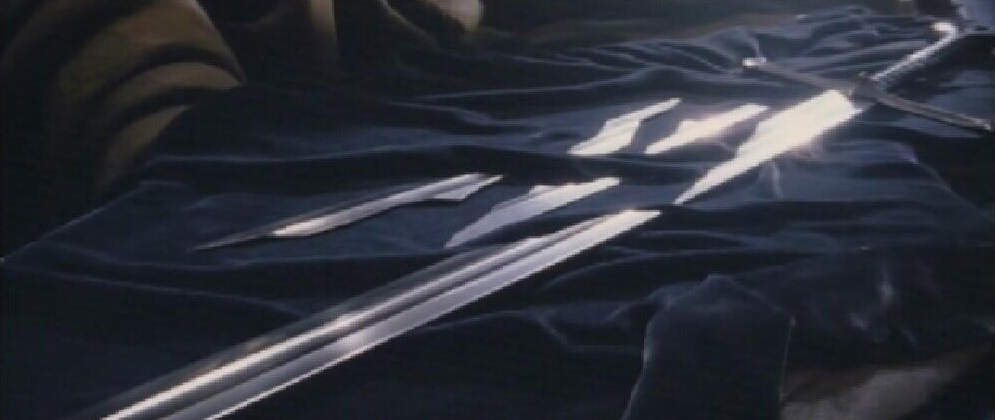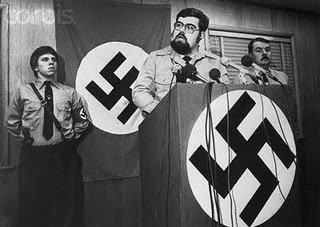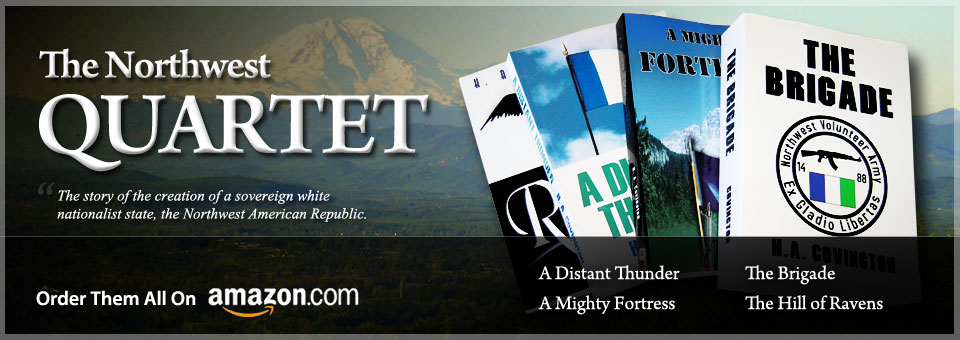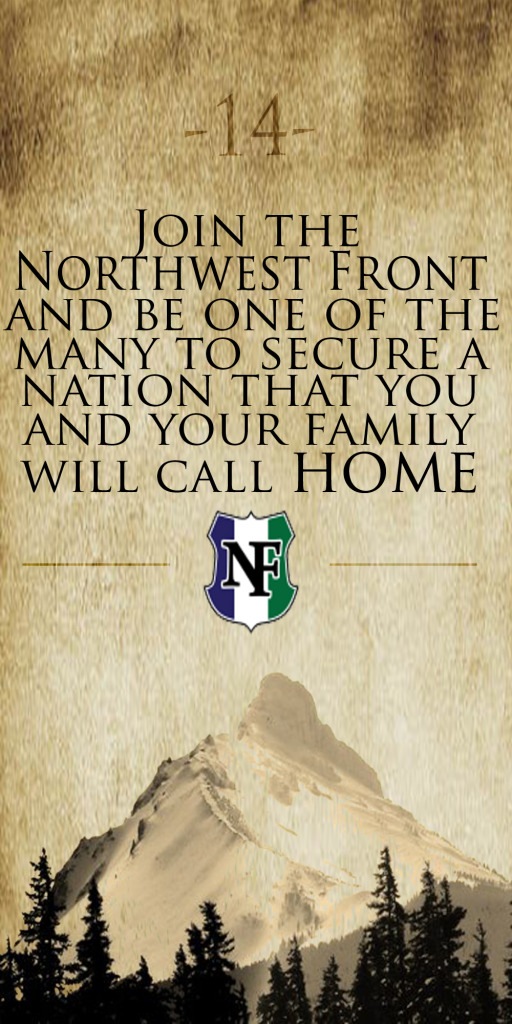The following articles, “The Sword” and “The Edge of the Sword,” published originally at The Occidental Quarterly, are the second and third essays in Michael O’Meara’s book Toward the White Republic, available from Counter-Currents Publishing here.

The Sword
My article “Toward the White Republic,” which recently won the TOQ essay contest (though under shady circumstances according to one critic), has been the subject of several internet discussions, most of which, typical of the medium, have produced more heat than light.
Nevertheless, around the margins of this discussion and in a few genuine flashes of insight buried under the rubble of meandering commentary, certain signs suggest that white racial consciousness in the English-speaking world may be in the process, however slowly, of changing, as white nationalists challenge the hegemony of the race realists.
I say this, of course, based on my particular understanding of white nationalism—which is mine alone—and not that of any group, least of all that of a conservative outfit like The Occidental Quarterly.
My sense of this changing consciousness is perhaps exaggerated by the fact that the prospects of white nationalism at last finding its way into the political arena seems a bit brighter now that the black Jesus is losing his magic touch, that the still too comfortable white middle class is already up in arms over his proposed Big Brother state (which they will have to pay for), and that the impending economic tsunami is about to sweep away the materialist illusions that have misguided whites for the last half century or so.
A great cleansing could be coming—probably won’t, but could.
Influenced by Heidegger and Evola, I’ve long believed that the “malaise” afflicting the white man is profound, traceable in part to the advent of modernity, which introduced certain civilizational and ontological principles inimical to European life.
This malaise has taken a toll no less on the racially conscious community, which upholds not a few of the same principles that are today responsible for the impending demise of white America: especially principles associated with the disembedded individualism of Adam Smith, the scientism of capitalism’s technoeconomic order, and the nihilism that seeks to disenfranchise religion, morality, and the significance of culture.
Part of this is due, I suspect, to the fact that the “racially conscious community” has long been dominated by the idealism of “race realists” or what, before 1945, was called “scientific racism,” a school associated with Madison Grant and Lothrop Stoddard, along with such scientists as Charles Davenport.
The tasks of “scientific racism” were considerably different than the tasks we now face. The largely scientific orientation of realists upholding their truths was appropriate to a society which still had a color-line and kept Negroes out of the public sphere. Against reformers, Jews, and do-gooders who sought to integrate alien races, race realists simply needed to demonstrate the terrible social and genetic costs of racial integration.
This not the case today, where the issue is a matter of asserting ourselves as a free people, rather than defending an already established status quo.
Though the principles of scientific racism are now clearly beyond the pale of respectability, science itself nevertheless remains the conceptual bedrock upon which modern liberal society rests.
Ideologically, liberalism emerged in the eighteenth century, as proponents of scientific rationalism endeavored to apply their principles to society and state. All traditions, beliefs, customs, and affiliations—that is, all the qualitative facets of life that are the source of meaning—were thus forced to give way to the quantitative, materialist, abstract, and inherently alienating imperatives of a scientific instrumentalism that sought to impose its bloodless order on the white world for the sake of homo oecomicus.
This emphasis on the materialist and quantitative has resulted in the comforts of our consumer society, as well as the less than comforting realities of its consummate meaninglessness. We may, as a consequence, be materially richer—yet spiritually, and in other ways, we’ve become the most desperate of the poor. A truly enriching life, as tradition holds, depends less on the means of existence than on its meaning.
It is only when the world is no longer experienced as a sacred whole and knowledge is fragmented into narrow scientific disciplines that man becomes a social atom regulated by purely rationalist principles detached from superior ideals and subjected to subpersonal, collectivist, and naturalist criteria, whose inevitable culmination is the present decadence.
To think, then, that a popularization of Salter’s Ethnic Genetic Interests, a revival of Darwinian biology (with its propensity to see organic life in terms of self-regulating market principles), or the privileging of a (philosophically naive) analytic-empiricism has any role to play in saving us from the menacing forces arrayed against white life—well, to be kind, it’s too absurd to refute.
Science simply does not understand human being, just as its truths cannot defend us from the forces favoring our extinction.
Heidegger says “science does not think”—it only enunciates the facts, which it has no means to interpret or evaluate—because that would mean appealing to normative, hence unscientific standards. Understanding is the work of culture—the work of accumulated legacies that imagine, populate, and make meaningful man’s world.
Science, as such, can’t tell us why a handful of men, armed only with a will and a goal, would think they could defeat the greatest empire in history or why my favorite aunt is the one who defends her country’s honor with a German accent.
As much as we nationalists respect the authority of science, we consider it secondary, say, to the extraordinary authority of Homer, who gave birth (in his myth-making) to the Greeks and the Greeks to all the rests of us.
What’s important, here, is to realize that the truths of the Iliad, or those of Mendelian genetics, are born of the imagination, not of some natural illumination, and that their significance pertains not to “the thing itself,” but to what lies in us, as a people rooted in time and being, with a destiny distinct to who we are.
One historian of the ancient Greeks, Paul Veyne, argues that: Men do not find the truth, they create it, as they create their history.
Thus it was that whenever the Greeks criticized the fictitious stories that had grown up around their myths, it was not to reject myth, but to uncover the deeper, more truthful basis—the authentic tradition—which they took as the ideal representation of who they were. For myth—this “constitutive imagination of their tribe”—is what gave them a meaning, a vocation, and a destiny—which is something quite simply beyond science’s capacity.
This is not to say that science is the opposite of poetic myth, in the way truth is the opposite of error, but simply that it is a different and by no means superior way, to know the world—at least the physical world in its quantitative and materialist expressions.
It is imagination, not the analytical formulations of science, that gives us access to the real in the world.
The notion that truth can be presented stripped of myth is itself a myth. Nietzsche argues that there are no facts, only interpretations. This doesn’t mean that the real doesn’t exist, only that it’s impossible to apprehend without some interpretative faculty, analytic or artistic, that rests on mythic foundations.
Myth, not coincidentally, undergirds the foundation of our culture. It operates still in the highest reaches of scientific speculation. It speaks to us as a collective solidarity, not an individual conscience; it expresses a determination to act; it is beyond dispute; it cannot be defeated; it speaks the language to which all human beings are most responsive; it transmits the defining experiences of authority and ultimacy, the source of sacredness.
For myth, the world is not a product of rational calculation, but rather a primordial legacy imbued with the weight of tradition, spirit, and blood.
It is the poet, relatedly, who creates nations, not the scientist. (Creativity, need it be added, is hardly born of analytical reason—if such a disembodied thing ever existed. The great scientific breakthroughs [as Kuhn with his “paradigms,” Bachelard with his “epistomological ruptures,” and Foucault with his “epistemes” explain] are rarely the product of a scientific reason applied to neutral source materials or facts, but rather come from something else entirely—something more akin to the creative side of the artist’s sensibility.)
Novalis said that “poetry is the base of society”—for without poetry, there is no myth, and without myth, there is no culture—and hence no means of creating a people.
When white nationalists appeal to a mobilizing myth, it’s not because they dismiss discursive reason or the authority of evidence and experience. Rather, they simply assume it to be the more elemental and galvanizing form of our understanding.
As Sorel, Le Bon, Pareto, Weber, Mosca, and others have shown, the success of an idea depends less on its logical virtues and demonstrative capacities than on its mythic representation of certain collective impulses.
If man were a machine, rationality alone would suffice. But man’s “rationality” is rooted in the irrationality of his collective consciousness, in the mythic postulates of his culture, in the norms and values of his communal existence, and in the strange, occasional stirrings of his blood.
White nationalists pay homage to race realists less for validating the significance of racial differences and highlighting the dangers of miscegenation (whose obviousness needs no scientific elaboration), but for their often gallant effort to keep America white.
Today, however, in this miscegenating age indifferent to the scientific implications of race differences, our task is not to defend a no longer existing racial hierarchy, but to save what remains of white America. The white nationalist struggle, as such, is about freeing whites from the anti-racist order threatening them—not about carrying out the sort of educational campaigns that occupied the scientific racists.
Race realism, moreover, is only a part of what defines white nationalism—no matter how primordial blood may be. The racial truths of the biological sciences are indeed meaningful only in the context of our people’s life. For they, not the material world of science, are what makes these truths significant.
In favoring an independent white homeland and assuming, rather than privileging, the postulates of race realism, white nationalists hold that the world is not a marketplace of ideas and that the best ideas rarely get the best market price. No matter how primordial blood may be, the white nationalist struggle is more about the soul and spirit that blood brings forth.
More crucially, white nationalists are not so naive as to believe that their America will be saved by facts or scientific demonstrations. Rather, they believe that only by acting as other oppressed and threatened nations have had to act to insure their survival will their America survive: That is, only by struggling to become a sovereign nation, free of the forces opposing them as a people, will their kind have a future (aspiring to do this, of course, in strict adherence to the legal provisions of the US Constitution).
White nationalists, as a consequence, assume that the defense and rebirth of white life in North America will have little to do with science or truth or justice or any other grand abstraction (so fond to the language of liberalism), but only with the struggle for power—a struggle old as the ages—one which, even in our dumbed-down information society, is not about issues related to science—but about the politics of imposing our cosmos (order) on the prevailing (and encroaching) chaos—above all, a political struggle in the Schmittian sense of determining who our real enemy is and of knowing that the ultimate goal is not about abstract truths, but about white survival.
La politique, Napoleon said, c’est le destin.
The political in this sense opposes scientific rationality, whose calculating and determining materialism drags man down to his animal side, and instead favors all that lifts man above and beyond himself, as a destining being.
Every distinct people is indeed a destiny forged by common values expressed in certain basic myths. Without those myths, there are no collective values and without collective values there are no common destiny—and no people.
This makes the struggle for nationhood a matter of political, cultural, and social struggle, not science.
The change I see affecting the racially conscious community is related to what may be an emerging understanding of the need now, if we are serious about guaranteeing a future for white children, to go beyond race realism and to start thinking like a nationalist vanguard, which sees itself as the kernel of a future White Nation—born from the desperation of the decayed and increasingly tyrannical system of the powers that be.
The historical course offered by myth, in contrast to the inherently passive determinism of scientific rationalism, is a choice for heroes, not bookworms or computer hobbyists, for it opens the future to those tiny grains of sand that inevitably bring the great machines to a grinding halt.
In the struggle we’ll need to wage if we are to survive, myth is not simply a more appropriate and powerful way to understand what needs to be done. It taps those primal forces that will empower us to reject the devitalizing forces of liberal modernity and to assert ourselves in a re-enchanted world with a destining project distinct to who we are, as New World Europeans refusing to accept our programmed extinction.
If there are odd individuals here or there who can or do respond solely on the basis of self-interest alone, that’s fine—but they are more likely to end up in the race realist rather than the white nationalist camp.
One final point: Besides promising to free us and ensure our continuity, the mythic imperatives of white nationalism offers us another chance to expiate our “sins”—to do the penance that will make us better men, more like our great grandfathers, as Harold Covington says—degenerate and characterless types that we have since become. For it’s not just that whites have been hoodwinked and manipulated by their new masters, as many would like to believe. From an Aryan perspective, they have all too readily abandoned almost everything that once made them such a world-forming race.
To undo all that has alienated us from our innermost spirit (and that’s a great deal), we no longer need to keep harping on the teachings of race science, which whites have been conditioned to resist. Instead, our task today is to recover the values and traditions that made our ancestors strong.
To do this we need, in imitation of those who have gone before and in anticipation of those who will follow, to struggle, sword in hand, to be what our myths have destined us to be.
The sword is white nationalism.
The Edge of the Sword
 Author’s Note: Myth and science are tangential to the real issue facing us, which is about politics and preservation. The following is an effort to sharpen (or maybe just to repeat) certain ideas presented in “The Sword.”
Author’s Note: Myth and science are tangential to the real issue facing us, which is about politics and preservation. The following is an effort to sharpen (or maybe just to repeat) certain ideas presented in “The Sword.”
One.
The starting point for all discussions of white preservation must begin with the realization that we have entered an Interregnum, a period of unprecedented danger during which we are destined to experience a great transformation. The most conspicuous sign of this came in November 2008, with the advent of the blackest night, symbol not of sleep but of death.
The question that now faces us is: Will it be our death as a people or the death in us of all those things that have led to this most desperate stage of our history?
Two.
The historical antecedents of white nationalism are many: Kearney’s Workingmen’s Party, the First and Second Klans, various state’s rights and segregationist movements of the 1940s and ’50s, perhaps George Wallace’s American Independent Party, as well as a horde of smaller, more sectarian organizations.
For the past generation, however, the racialist movement defending our way of life has ceased to be political and become largely a race-realist affair—which was to be expected, given that the race realists presently dominating white discourse are the heirs of the prewar “scientific racists,” who saw their task in essentially educational terms.
Three.
Scientific racists in the early twentieth century indeed played an important intellectual role in defending the existing system of racial relations.
But that role bears no relationship to the one facing white Americans in this period, however much race realism remains a crucial part of the white-nationalist arsenal.
Then, when scientific racists commanded the center stage of public opinion, America was still a white man’s country, it had a well delineated color line, an established racial hierarchy (which most whites unconsciously accepted), and twice it succeeded in imposing immigration restrictions on a reluctant government (against Asians in the early 1880s and against non-Nordics between 1921 and ’24).
In this context, scientific racists—who came mainly from the upper classes and were often academics or intellectuals—merely needed to popularize their findings to defend the pro-white status quo.
Today, their race realist successors have continued in this tradition, trying to re-educate whites in the knowledge of what their great grandparents once knew.
This knowledge, moreover, is mainly of a scientific kind and aimed primarily at informing elites and influencing public policy—typical Enlightenment forms of metapolitics. Not coincidentally, such metapolitics accepts the liberal supposition that man’s world revolves around the objectively-defined self-interest of rational individuals, whose identities are rooted in materialist considerations rather than in the infinitely less quantifiable ones of history, culture, and kin.
Four.
As Rome burns, the question inevitably arises of how reasonable it is to continue writing cookbooks amidst the flames devouring us. This, though, is what race realists will end up doing if our racially conscious community does not soon break with its naive scientism and assume the shape of a political-metapolitical front to represent the higher collective interests of European America.
Five.
Since state policy has turned against white Americans and come to pose a direct threat to their continuity, our tasks today is a matter of ensuring our collective survival as a people, which means it is a matter of forming organizations and movements to struggle on our behalf.
Six.
To this end, white nationalists will need to break with the exclusively academic/scientific orientation of race realists and start building a nationalist vanguard to lead their people. The question is: How?
This is the question that needs to be addressed and addressed not as an epistemological issue (i.e., as an issue of knowledge), but politically, culturally, socially, and in other ways that intersect our experiences in the world.
Seven.
Science (which too is infused with myth and ideology) is for academic debate, myth and ideology are for popular social movements. There is, though, no hard and fast division between them. Those seeking to make the epistemological difference between them primary seem not fully conscious of the great historical tasks facing white men in the twenty-first century, just as their dismissal of popular political mobilizations as a “misty and idealistic totemism” seems to reflect the typical liberal propensity to avoid engagements that might involve them in real world activity.
Context here is all important. If I need a cancerous growth removed from my body, I’m not going to have a student of myth do it, just as if I want to learn about José Antonio Primo de Rivera, I would prefer to ask a Spanish historian rather than a geneticist.
Similarly, if I want to build a nationalist movement, I know it’s going to take something more than the virtues of Frank Salter to convince whites to abandon their individualistic and materialistic lives (which, incidentally, are usually led under the sign of self-interest)—it will take something bigger and grander that touches them at the core of their being.
That something can only be found in myth, culture, history, and blood—in all those things that transcend the individual, that link him to a higher destiny, and that refuse the safe, sanitized detachment of modernity’s privatized realm.
Eight.
Myth is not “mystification,” even if our naive empiricists assume it to be; it is simply another way (and at times a more powerful way) of apprehending and communicating a truth.
In one situation it is obviously appropriate, in another situation science is.
A mythic figure like Jeanne d’Arc touches a Frenchman more profoundly than the vast intellectual heritage of Cartesianism because St. Joan evokes a hundred defining emotions lodged in a Frenchman’s heart, doing so in ways that the elegant, yet bloodless postulates of Descartes’ scientific rationalism cannot.
The Cartesians’ powerful heritage is not, as a consequence, unimportant to France; it simply has little role to play in defending the nation from those who seek its destruction. Relatedly, in the numerous assertions of France’s nationalist movement, St. Joan is omnipresent because of all she represents, while Descartes rarely has anything to add, except perhaps in keeping debates at the conceptual level orderly and logical.
If you want, then, to engage in discussions about race and racial differences, you bring in the geneticists and Darwinists. But if you want to build a nationalist movement to ensure the continuity of white America, you appeal to Andrew Jackson and Thomas Jefferson, to the Battle of the Alamo and Kearney’s Workingmen, to the Stars and Bars and the sustaining voices of those quintessential representatives of America’s white culture, the Carter family.
Those who think that IQ, JQ, EGI, GSS, HBD, etc., are somehow more important in mobilizing a people than appeals to their spirit or destiny do not seem to know, “empiricists” that they claim to be, anything of history, especially the history of the nationalist and labor movements that shaped much of the nineteenth and twentieth centuries.
A preference for scientific demonstration rather than political mobilization is, moreover, the strategy of middle-class intellectuals, whose world is defined by the classroom, the computer monitor, and tedious faculty meetings. Political appeals to a people’s cultural and mythic paradigms, on the other hand, are the meat and drink of militants who associate with workers and soldiers, organize local cells and demonstrations, and, when the time comes, raise barricades in the street—to defend their neighborhood from marauders, or perhaps to do what used to be done, in front of Paris’ Hôtel de Ville.
Nine.
The world is not a debating society.
It’s hardly coincidental that Carl Schmitt characterized the liberal, whose ideology distorts his perception of the real, as someone who thinks debate alone in politics suffices.
The politics of the friend/enemy dichotomy is accordingly irrelevant to the liberal, who prefers to reason with the enemy, as he tries to buy him off.
Life/Death, Friend/Enemy: This primordial polarization poses the great political question—the question that brings us to the point where we are compelled to ask ourselves: How are we going to defeat the enemy who threatens our existence?
Contrary to the contention of certain cyber pundits, this is not a matter of deciding who is more intelligent or who commits the most crimes. My commitment to the white nation wouldn’t change even if we were the least intelligent of the races or the most criminally prone.
To defeat the enemy is, rather, a question of deciding what political options are available to us: Will it be a Great Trek to a new homeland; will it be a matter of reviving the heritage of the Borderland Celts, who settled the Indian-occupied frontier and defended the Alamo with rifle in hand; will it involve parliamentary or extraparliamentary actions that mobilize our people; or will it simply be a waiting game, to see how well we can prepare ourselves for the coming crash, when the wolves will be allowed into the very bosom of the city.
Who knows what course awaits us?
The one thing, though, that I hope we can all agree on at this point is the importance of making ourselves ready—by being as independent as possible, by keeping in good physical and mental shape, by ensuring that we are well-located, by knowing who we are and what we stand for—but above all by doing something, anything, in the real world to prefigure what will become the White Nation.
Very little of this, I’m afraid, will have anything to do with marshaling evidence from biological texts—that’s a diversion better left to the liberal modernity whose racial horrors we seek to escape.







